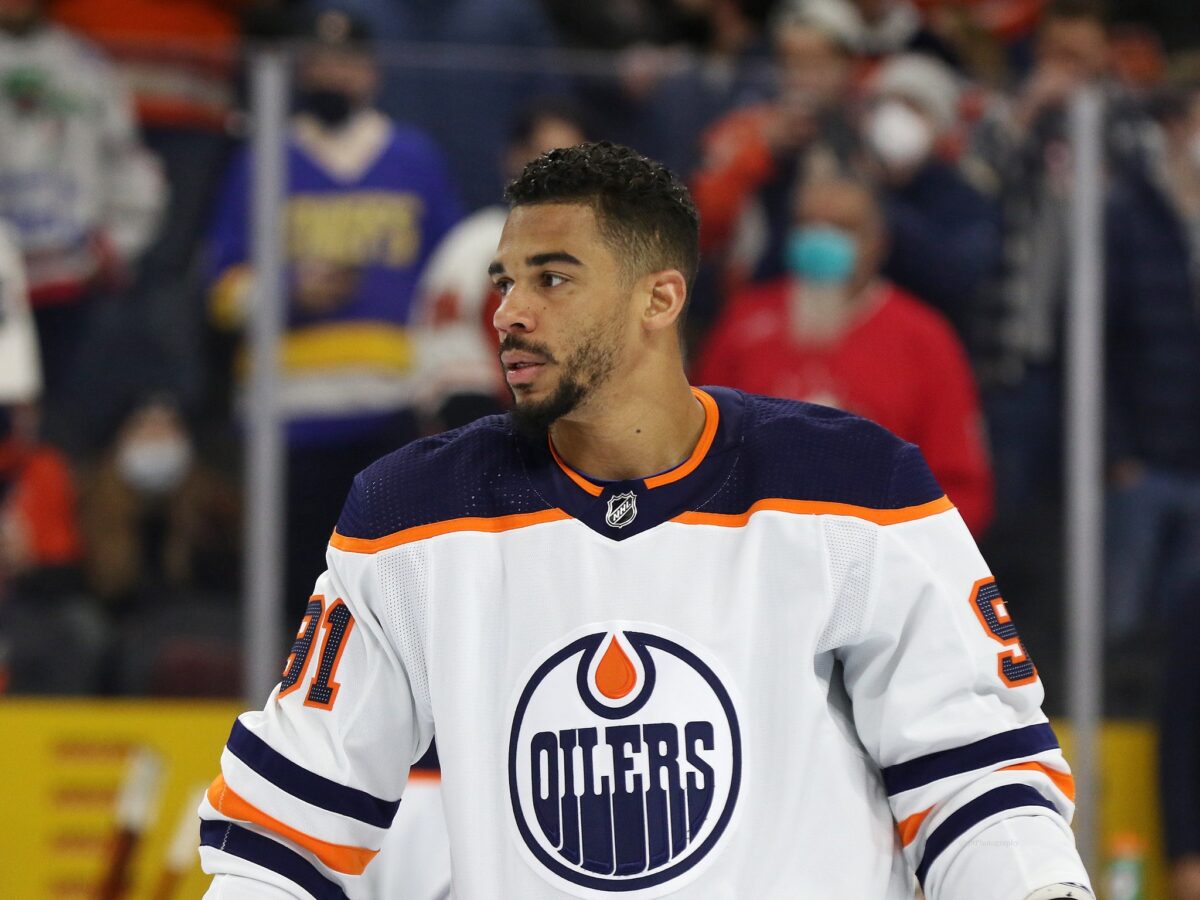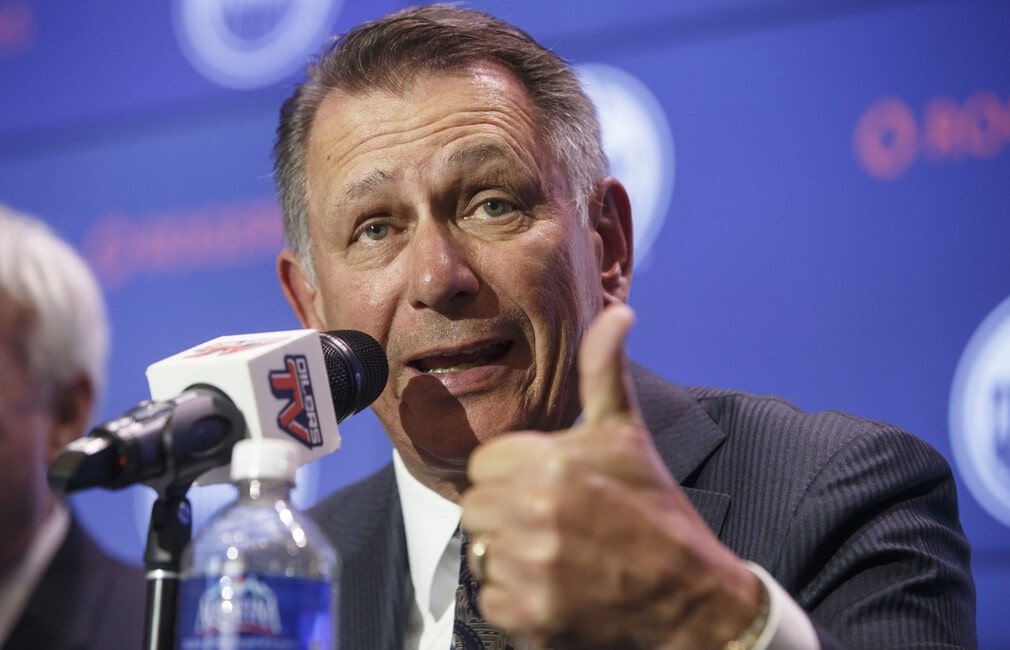NHL Deputy Commissioner Bill Daly offered up some very interesting information this week when he relayed details regarding Evander Kane‘s grievance hearings with an arbitrator and the San Jose Sharks. Essentially, because the arbitrator isn’t available all of June, the NHL is working on booking meetings into early July, but the process could play out well into the month and not be resolved until after free agency begins on July 13. In the meantime, it sounds like the NHL won’t stand in the way of Kane signing a free agency deal with another team.
Daly said, “We’re currently in discussions with the Players’ Association as to what all that means in terms of Evander’s status. If it goes to the second day of hearings and we wait for a decision from the arbitrator, which will be a written award, my guess is that will be past the date of free agency.”
Related: Oilers Could Lose Kane Back to Sharks Unless a Side Deal is Worked Out
What’s so incredibly odd about this, is that the NHL doesn’t seem to be bothered by the fact that multiple teams and an important player in free agency could be dramatically affected by this delay. Not knowing Kane’s status puts teams at a disadvantage, means Kane doesn’t know if he can sign with a team without messing up their other summer plans, and stops the Sharks from potentially signing players if they’re on the hook for more money than they anticipated having to spend as an organization.
There is one potential solution: a pre-planned, big trade that acts as a backup plan if everything goes sideways.
How This Kane Grievance Could Play Out
Both Elliotte Friedman and Jeff Marek discussed the insanity that is this grievance possibility on their recent 32 Thoughts Podcast. What Marek found so odd is that Kane could essentially sign with another team and then, if the Sharks lose their grievance, and Kane has to go back to the Sharks, Kane’s new free agency deal would be considered null and void. Daly said, “His [Kane] position is his contract with San Jose should be reinstated in full, which would clearly supersede any contract he might sign as a free agent.” In other words, the team who signs him in free agency could lose still him with little-to-no recourse.

Take for example the Edmonton Oilers. They clearly want to sign Kane to an extension. If they do, and Kane wins his grievance, the Sharks could take him back. The Oilers are then out of luck and likely had to move players out to make room for Kane’s contract. Conversely, the Oilers might hold off on signing other players because they needed the salary cap space to fit Kane in. Essentially, the Oilers are putting a lot of things on pause just to get a Kane deal done. They could then find out it was all for nothing if the Sharks take him back.
Oilers Would Be Flirting With Danger
Let’s say the Oilers are committed to signing Kane and willing to give him the type of money he’s rumored to be asking for. That likely means saying goodbye to one of Ryan McLeod, Kailer Yamamoto or Jesse Puljujarvi. But, if Kane signs and is then taken away by the Sharks, the Oilers don’t have a way to get one of those players back. Simply put, they don’t get a mulligan or a do-over.
The best the Oilers would get in that situation is the extra cap space that comes with not having to pay Kane and having moved another player. That sounds acceptable, but the issue becomes what players are still out there in free agency at that point. The best players often go quickly and if the Kane grievance isn’t solved until days after free agency opens, Kane going back to the Sharks puts the Oilers in a tight spot. They have money, but no good players to spend it on.
What Would the Solution Be?
Friedman talked to an NHL GM — one who isn’t interested in signing Kane in free agency — and asked what he would do in this situation. The only suitable solution he could come up with was that any team who signed Kane would need to have a backup trade agreement already in place with the Sharks. This way, if the arbitrator rules in favor of Kane and the Sharks choose to take him back, a trade happens immediately afterward with the team who signed Kane to a free agency deal.

This is really the only way that team can feel secure in signing Kane and not losing him for nothing. Ultimately, they get the player, but in a roundabout way. In the Oilers’ case, that means talking to the Sharks now, working out a trade that counts as a backup plan, and signing Kane. The Oilers would have to cover their tracks if this Kane grievance isn’t going to be solved for a while.
What Might a Trade Look Like?
If the Oilers sign Kane for, let’s say, $6 million per season, then he’s taken back by the Sharks, Edmonton could have a deal in the bag with San Jose to move a player to San Jose for Kane with a $1 million retained salary worked in from San Jose’s end. Edmonton still gets Kane for the $6 million, has him for three more seasons, and moves a player to the Sharks in the process.
Who that player is or what the Sharks would want isn’t clear, but the best-case scenario might be sending a player with some money attached to his deal.
You may also like:
- Oilers Week Ahead: Schedule & Storylines – Trade Deadline, Mangiapane, Centre Search and More
- Oilers Place Andrew Mangiapane & Alec Regula on Waivers
- NHL Rumours: Thomas to Mammoth, Henrique Staying & Kings Forward Hunting
- Oilers’ Chances of Winning the Cup Being Held Back by Nurse & His Contract
- NHL Morning Recap – March 1, 2026
